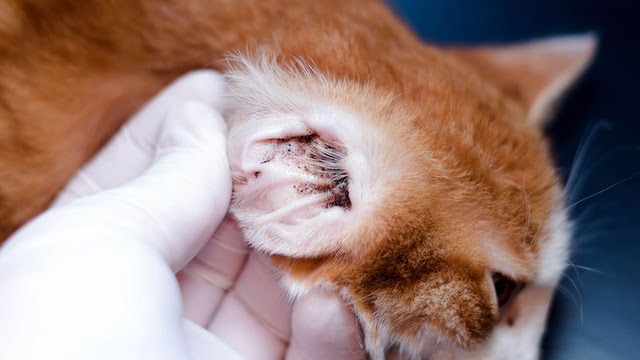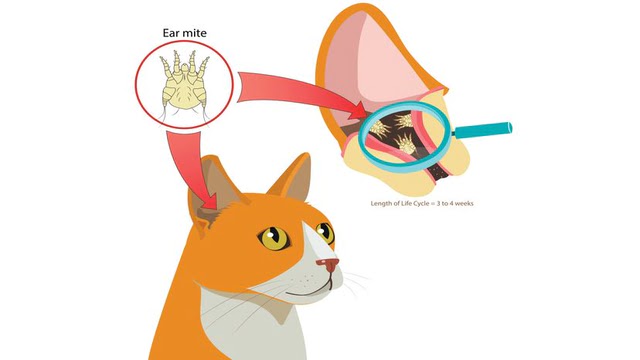Quck answer
Ear mites are a common problem among cats. They can cause irritation, discomfort, and even lead to infections. Fortunately, there are several home remedies that can help alleviate the symptoms. These include cleaning the ears with a mixture of water and apple cider vinegar, applying a mixture of olive oil and vitamin E to the ears, and using a mixture of garlic and olive oil as an ear drop. It’s important to consult with a veterinarian before trying any home remedies and to follow their advice for treatment. Additionally, it’s important to regularly clean your cat’s ears and keep them free of debris to prevent future ear mite infestations.
Pets

While ear mites can be a problem for cats and even dogs, it is possible to treat them at home. These tiny, parasitic insects live and breed in the ear canals, feeding on skin debris, cell fluids, and blood. Their presence can cause severe itching, leading to cats scratching their ears, shaking their heads, or holding their ears at an odd angle.
The good news is that treating ear mites at home is relatively simple. The first step is to confirm that ear mites are indeed the problem. This can be done by gently removing a bit of the crumbly debris from your cat’s ear canal and examining it under bright light. If you see any movement, including tiny white specks, it’s likely that your cat has ear mites.
Other symptoms of ear mites include inflammation, redness, hair loss, and scabs around the ears, as well as a strong odor. If you notice any of these symptoms, it’s important to treat the problem promptly to prevent it from spreading to other animals in your household.
Before treating your cat for ear mites, it’s essential to make sure that ear mites are, in fact, the problem, as other ear conditions can cause similar symptoms. If you’re unsure, it’s best to take your cat to the vet.
Assuming that ear mites are the problem, there are several home remedies you can try. These include using mineral oil, vinegar, or hydrogen peroxide to clean your cat’s ears, as well as applying a topical insecticide to kill off the mites. It’s also essential to treat all animals in your household to prevent the mites from spreading.
If you’re unsure about how to treat ear mites or your cat’s symptoms persist, consult a veterinarian for further advice and treatment options.
How to Treat Ear Mites in Cats

Ear mites can lay eggs deep inside a cat’s ear canal, making it essential to flush them out for several weeks to eliminate both the live mites and eggs. The treatment process involves three steps. Firstly, use an ear cleaning solution for cats to eliminate as many mites from the ear canal as possible. Put a few drops of the solution into the ear canal and gently massage it. This will help to bring debris up to the outer part of the ear, where you can wipe it away with a cotton ball or tissue. Avoid using cotton swabs as they could damage the eardrum. Repeat the cleaning process until all debris is gone.
Secondly, over-the-counter medicines can be used to kill ear mites. However, it’s important to choose a safe product for cats. Pyrethrin, the active ingredient in most ear mite medications, is toxic to cats. A better option would be a topical solution containing ivermectin as the primary ingredient, which can be found in most pet supply stores. Follow the instructions on the topical carefully, ensuring that you massage the drops in well and wipe away any excess. A single cleaning and treatment won’t suffice as one surviving female mite with eggs can reproduce. Both the living mites and eggs must be killed.
Lastly, it’s crucial to prevent your cat from being reinfested with mites. A single mite could hide deep in your cat’s fur and crawl back into the ear once the treatment is over. Microscopic mite eggs could also hatch days after treatment, so it may take a few weeks before you can assume that your cat and home are mite-free. Additionally, cats with ear mites require regular treatment with flea products to get rid of adventurous mites that explore elsewhere.
If your home remedies don’t clear up the infestation, or if the skin in or around your cat’s ears becomes raw or inflamed, take your cat to the vet. The vet can prescribe medications that work faster than over-the-counter meds. If your cat has itchy ears, shakes her head, flattens her ears and has discharge from the ear canal, but no mite debris or live mites, consult your vet. It could be a yeast or bacterial infection or another type of ear problem.
Originally Published: May 20, 2011
FAQ on Ear Mites in Cats
What is the procedure to get rid of ear mites in cats?
The three-step process to get rid of ear mites in cats involves cleaning the ear, applying ear mite medicine, and using over-the-counter medication. The process should be repeated every day until the mites are gone.
How can you tell if your cat has ear mites?
Your cat may have ear mites if they shake their head frequently or scratch their ears more than usual. You can check for the presence of a dark-brown crumbly substance inside the ear, which can be gently removed and checked under a magnifier under a bright light to confirm.
What medicine is effective in killing ear mites?
Any medicine or product that contains pyrethrins can kill ear mites, but it is toxic to cats, so caution must be taken when using it. Most vets now recommend using over-the-counter medications that contain ivermectin instead.
Is it necessary to take your cat to the vet for ear mites?
If your home remedy for killing ear mites does not work, it is best to take your cat to the vet for treatment before it leads to an ear infection.
Does oil kill ear mites?
No, oil does not kill ear mites.
Find out more
Related Articles
- Home Remedies for Cats with a Cough
- Home Remedies for Cats with Dandruff
- Home Remedies for Cats with Diarrhea
Sources
- ASPCA. “Ear Mites.” ASPCA Pet Care. 2011. (April 12, 2011)http://www.aspca.org/pet-care/cat-care/ear-mites.aspx
- Companion Animal Parasite Council. “Ear Mites in Cats.” CAPC. 2009. (April 13, 2011)http://www.petsandparasites.org/cat-owners/ear-mites.html
- Drs. Foster & Smith Educational Staff. “Caring For Your Cat’s Ears.” Drs. Foster & Smith. 2011. (April 12, 2011)http://www.drsfostersmith.com/pic/article.cfm?aid=106
- Eldgedge, Debra M., et al. “Cat Owner’s Home Veterinary Handbook.” Howell Book House. Dec. 10, 2007.
- PetsMD. “Ear Mites in Cats and Dogs.” Pets MD. 2011. (April 12, 2011)http://petsmd.com/Health/Cats-And-Dogs/Ear-Mites
FAQ
1. What are ear mites in cats?
Ear mites are tiny parasites that live in the ear canals of cats. They feed on the wax and oils in the ear canal and can cause irritation, inflammation, and infection.
2. What are the symptoms of ear mites in cats?
The most common symptoms of ear mites in cats are shaking of the head, scratching at the ears, and a dark brown or black discharge in the ear canal.
3. How are ear mites in cats diagnosed?
Ear mites can be diagnosed by your veterinarian through a physical exam and by taking a sample of the discharge from the ear canal to examine under a microscope.
4. Are there any home remedies for treating ear mites in cats?
Yes, there are several home remedies that can be used to treat ear mites in cats, including cleaning the ears with a mixture of water and apple cider vinegar, applying coconut oil to the ears, and using a mixture of garlic and olive oil.
5. How do I clean my cat’s ears?
To clean your cat’s ears, use a cotton ball or soft cloth soaked in a mixture of half water and half apple cider vinegar. Gently wipe the inside of the ear canal, being careful not to push any debris further into the ear.
6. Can I use hydrogen peroxide to clean my cat’s ears?
No, hydrogen peroxide can be too harsh for a cat’s delicate ears and can cause irritation and damage to the ear canal.
7. How often should I clean my cat’s ears?
Cleaning your cat’s ears once a week is usually sufficient, but it may need to be done more often if your cat is prone to ear infections or has a buildup of wax and debris.
8. How do I apply coconut oil to my cat’s ears?
Melt the coconut oil by placing it in a warm bowl of water. Once it has melted, use a dropper to apply a few drops of the oil into each ear canal. Massage the base of the ear to help distribute the oil.
9. Can I use tea tree oil to treat ear mites in cats?
No, tea tree oil can be toxic to cats and should not be used to treat ear mites.
10. Are there any over-the-counter treatments for ear mites in cats?
Yes, there are several over-the-counter treatments for ear mites in cats, including ear drops and sprays that contain pyrethrins. However, it is important to follow the instructions carefully and consult with your veterinarian before using any products on your cat.
11. How long does it take to treat ear mites in cats?
The length of treatment for ear mites in cats can vary depending on the severity of the infestation and the type of treatment used. In general, treatment can take anywhere from a few days to a few weeks.
12. Can ear mites be prevented in cats?
Ear mites can be prevented in cats by keeping their ears clean and dry, and by regularly checking for any signs of infestation. It is also important to treat any other pets in the household, as ear mites can easily spread from one animal to another.





Leave a Reply